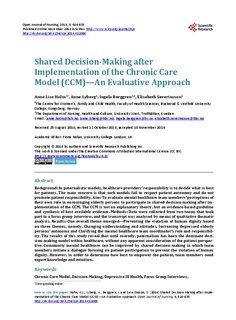| dc.contributor.author | Holm, Anne Lise | |
| dc.contributor.author | Lyberg, Anne | |
| dc.contributor.author | Severinsson, Elisabeth | |
| dc.contributor.author | Berggren, Ingela | |
| dc.date.accessioned | 2015-01-21T09:13:35Z | |
| dc.date.accessioned | 2016-10-21T08:22:44Z | |
| dc.date.available | 2015-01-21T09:13:35Z | |
| dc.date.available | 2016-10-21T08:22:44Z | |
| dc.date.issued | 2014 | |
| dc.identifier.citation | Open Journal of Nursing 2014, 4(12):824-835 | nb_NO |
| dc.identifier.issn | 2162-5344 | |
| dc.identifier.uri | http://hdl.handle.net/11250/2416817 | |
| dc.description.abstract | Background: In paternalistic models, healthcare providers’ responsibility is to decide what is best for patients. The main concern is that such models fail to respect patient autonomy and do not promote patient responsibility. Aim: To evaluate mental healthcare team members’ perceptions of their own role in encouraging elderly persons to participate in shared decision-making after implementation of the CCM. The CCM is not an explanatory theory, but an evidence-based guideline and synthesis of best available evidence. Methods: Data were collected from two teams that took part in a focus group interview, and the transcript was analysed by means of qualitative thematic analysis. Results: One overall theme emerged—Preventing the violation of human dignity based on three themes, namely, Changing understanding and attitudes, Increasing depressed elderly persons’ autonomy and Clarifying the mental healthcare team coordinator’s role and responsibility. The results of this study reveal that until recently, paternalism has been the dominant decision-making model within healthcare, without any apparent consideration of the patient perspective. Community mental healthcare can be improved by shared decision-making in which team members initiate a dialogue focusing on patient participation to prevent the violation of human dignity. However, in order to determine how best to empower the patient, team members need expert knowledge and intuition. | nb_NO |
| dc.language.iso | eng | nb_NO |
| dc.rights | Navngivelse 3.0 Norge | * |
| dc.rights.uri | http://creativecommons.org/licenses/by/3.0/no/ | * |
| dc.subject | Chronic Care Model | nb_NO |
| dc.subject | Decision-Making | nb_NO |
| dc.subject | Depressive Ill Health | nb_NO |
| dc.subject | Focus Group Interviews | nb_NO |
| dc.title | Shared decision-making after implementation of the Chronic Care Model (CCM) - an evaluative approach | nb_NO |
| dc.type | Journal article | nb_NO |
| dc.type | Peer reviewed | |
| dc.date.updated | 2015-01-21T09:13:35Z | |
| dc.subject.nsi | VDP::Medisinske fag: 700::Helsefag: 800 | nb_NO |
| dc.subject.nsi | VDP::Midical sciences: 700::Health sciences: 800 | nb_NO |
| dc.source.pagenumber | 824-835 | nb_NO |
| dc.source.volume | 4 | nb_NO |
| dc.source.journal | Open Journal of Nursing | nb_NO |
| dc.source.issue | 12 | nb_NO |
| dc.identifier.doi | 10.4236/ojn.2014.412088 | |
| dc.identifier.cristin | 1178297 | |
| dc.subject.keyword | Mentalhelse / Mental health | |
| dc.relation.project | Norges forskningsråd: 204238 | nb_NO |

